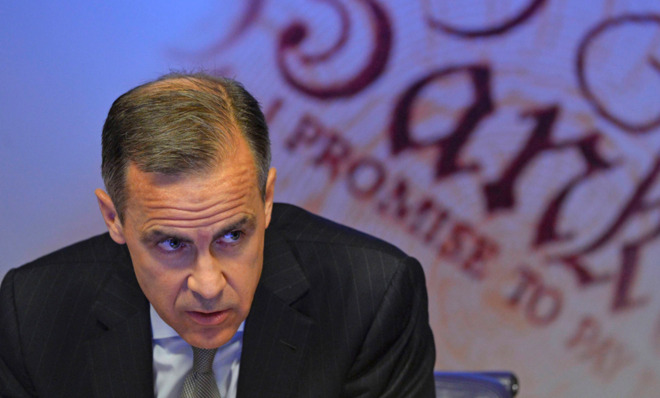Careless whisper: What Janet Yellen could learn from Mark Carney's big mistake
In the world of central banking, words matter

A free daily email with the biggest news stories of the day – and the best features from TheWeek.com
You are now subscribed
Your newsletter sign-up was successful
Britain's FTSE 100 stock index fell to a six-week low today — and for that you can thank the careless words of a central banker.
In a keynote speech, Bank of England chief Mark Carney warned that interest rates may rise from their current level of 0.5 percent this year. He hedged his comment by claiming that "no decisions have been made" yet, and that any decision would be "data dependent," but the damage was already done. It was a major slip, one that Federal Reserve Chairwoman Janet Yellen should seek to avoid.
In the case of central bankers, words really do matter. Former Fed Chairman Ben Bernanke inaugurated regular press conferences to clue markets in to the Fed's thinking. A false note can easily cause whiplash in markets, tighten up lending, and stoke expectations for weaker growth and deflation. And the worst part of it is that Carney had no reason to freak out investors as he did.
The Week
Escape your echo chamber. Get the facts behind the news, plus analysis from multiple perspectives.

Sign up for The Week's Free Newsletters
From our morning news briefing to a weekly Good News Newsletter, get the best of The Week delivered directly to your inbox.
From our morning news briefing to a weekly Good News Newsletter, get the best of The Week delivered directly to your inbox.
Since 2008, the British economy has suffered a worse economic slump than the Great Depression. The economy is finally showing a few green shoots, growing 2.9 percent over the last year, with unemployment falling to 6.6 percent. British inflation remains a tame 1.8 percent, below the Bank of England's 2 percent inflation target.
You would think that interest rate hikes would be the last thing on Carney's mind; sustaining growth and lowering unemployment loom much larger as economic priorities. But apparently you would be wrong.
Now, Britain has a problem that the United States doesn't have. Britain has booming real estate prices, particularly in London. In the last year, average prices rose by 6.7 percent, and in London by 17 percent, stoking fears of a housing bubble. Carney has expressed worries about this in recent months.
Carney has correctly argued in the past that the problem is a lack of housing supply. "While you might describe London's annual jump of over 16 percent as being as a result of a very frothy market," Carney has said, "it is underpinned by long-term demand and a genuine shortage of housing supply."
A free daily email with the biggest news stories of the day – and the best features from TheWeek.com
So hiking interest rates will not deal with Britain's housing supply problem or its housing price boom. Only relaxing planning laws and building more housing stock will do that.
Of course, if inflation rises back above the Bank of England's 2 percent target, and unemployment continues to fall, then it would be appropriate to hike interest rates.
But there are significant reasons to believe that inflation is unlikely to emerge anytime soon. Inflation is low throughout the developed world, in spite of years of ultra-loose monetary policy, suggesting that deflationary pressure is strong. That doesn't mean that inflation won't suddenly rise. It could. But until inflationary pressure begins to show and markets are demanding rate hikes to quell it, why even talk about it?
Hopefully this was just a slip of the tongue. But the worrisome thing is that other central banks have drank the inflationista Kool Aid. That's what recently happened in Sweden, where the central bank hiked rates against a background of low inflation in the name of "financial stability," only to find itself with rising unemployment and sucked into a Japanese-style deflationary spiral.
Janet Yellen badly needs to avoid making these kinds of mistakes if the U.S. is to sustain its recovery.
John Aziz is the economics and business correspondent at TheWeek.com. He is also an associate editor at Pieria.co.uk. Previously his work has appeared on Business Insider, Zero Hedge, and Noahpinion.
-
 The ‘ravenous’ demand for Cornish minerals
The ‘ravenous’ demand for Cornish mineralsUnder the Radar Growing need for critical minerals to power tech has intensified ‘appetite’ for lithium, which could be a ‘huge boon’ for local economy
-
 Why are election experts taking Trump’s midterm threats seriously?
Why are election experts taking Trump’s midterm threats seriously?IN THE SPOTLIGHT As the president muses about polling place deployments and a centralized electoral system aimed at one-party control, lawmakers are taking this administration at its word
-
 ‘Restaurateurs have become millionaires’
‘Restaurateurs have become millionaires’Instant Opinion Opinion, comment and editorials of the day